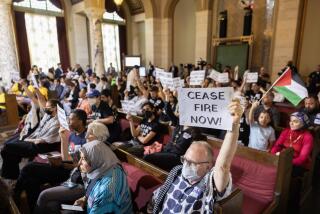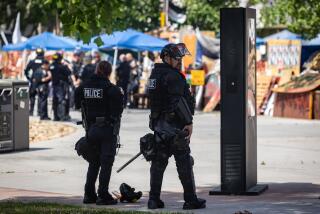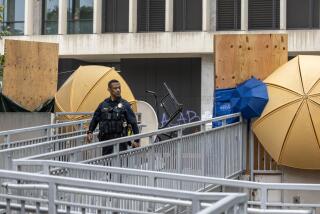LAPD and Occupy L.A. protesters face off
- Share via
Occupy L.A. protesters, whose eight-week encampment on the City Hall lawn has become a political hot potato for city leaders, were locked in a tense standoff with police at one downtown intersection late Tuesday as demonstrators vowed to resist efforts to evict them.
At Broadway and 1st Street — one of several intersections blocked off by police in advance of the action to remove the protesters — a line of about 12 officers in riot gear and holding batons blocked the street as about 100 demonstrators chanted and took photos.
Clusters of protesters shouted: “You’re hella old! Are you going to be on the side of Dr. King?”
The tense scene came as the Los Angeles Police Department closed off an area from Temple Street on the north to 3rd Street on the south and Alameda Street on the east and Broadway on the west.
An LAPD helicopter announced the commencement of the department’s action, swooping down low and incessantly circling the City Hall steps on which hundreds of protesters had gathered. It flooded the camp with its high-powered searchlight and the din from its propellers threatened to drown out the protesters’ chant of “Occupy L.A., all day, all night!”
Someone then launched fireworks over the camp.
Earlier in the evening, officials issued a citywide tactical alert. An LAPD email said the tactical alert was “due to an unusual occurrence in downtown L.A.”
Occupy L.A. protesters vowed Tuesday to maintain a nonviolent posture as they prepared to be arrested and evicted from their encampment.
Organizers announced Tuesday evening that a police raid at the camp was imminent and began to talk about where the movement would go once demonstrators were removed.
Some protesters lined up trash cans and plastic recycling bins at the main entrance to the lawn as a barrier against police. Others shared phone numbers for bail bondsmen and attorneys.
The LAPD did not publicly divulge its plans. But late Tuesday, large numbers of police cars were streaming into Dodger Stadium, where officers were staging and climbing aboard buses.
The LAPD had set a Monday morning deadline for protesters to leave, but it came and went without officers forcibly removing them.
Los Angeles Police Chief Charlie Beck said the department had noticed the number of tents at the lawn declining significantly in recent days.
Although Beck said the department wants to avoid confrontation, he said it was only a matter of time until police moved in and arrested demonstrators who refuse to leave.
Earlier Tuesday, speaking from his City Hall office, which overlooks the lawn where protesters set up tents nearly two months ago, Mayor Antonio Villaraigosa said he decided to order the park closed after he learned there were children staying there. Given the smattering of assaults and other incidents reported at the camp, “the chaos out there could produce something awful,” he said.
The mayor, a former union organizer and former president of the Los Angeles chapter of the American Civil Liberties Union, said he and Beck made the decision to allow overnight camping on the lawn in the hope of charting a “different path” with protesters. That was, he said, in part because he respects many of their views.
Many at the tent city — which grew to include its own library, a multitude of committees and even a schedule of yoga classes — were drawn by outrage at economic policies that they say favor the rich. But many also pledge allegiance to other causes, including legalizing marijuana and ending the Federal Reserve.
As the protest wore on, Villaraigosa said it became clear that the city would not be able to negotiate an end to the demonstration because “the process for them to reach an agreement made it impossible.”
At Occupy L.A., decisions are made by 100% consensus at a nightly general assembly. When it was revealed last week that several protesters had been meeting with police and an official from the mayor’s office in private talks, outrage spread through the camp.
Villaraigosa said there were other concerns in addition to the presence of children. Those include public health risks and the extensive damage to the City Hall lawn, which Villaraigosa estimates will cost “in the hundreds of thousands of dollars” to repair.
On Friday, Villaraigosa and Beck announced that the city would be closing the park at 12:01 a.m. Monday and enforcing the closure at some point after that. In the three days since the announcement, about half of the tents have been taken down, and many of the women and children who had been sleeping at the camp are gone, Villaraigosa said.
Protesters were incensed by news of the park’s closure, which they said went against a City Council resolution supporting the protest. On Tuesday, about a dozen protesters caused a stir at a council meeting when they read a list of demands.
The protesters, who read their demands as most of the lawmakers went about business as usual, also asked the City Council and the mayor to address a general assembly meeting.
Villaraigosa said he never considered attending one of the Occupy L.A. meetings.
“I think they’ve made it clear that they don’t trust government, the City Council or the mayor,” he said. “I thought it would be more fruitful to have talks without me as an impediment. I thought it would be more productive to have my staff talk with them, and they talked with them a lot.”
Los Angeles Times staff writers Jason Song, Rick Rojas, Alejandro Lazo, Ricardo Lopez, Robert J. Lopez, Rong-Gong Lin II and Armand Emamdjomeh contributed to this report.
More to Read
Sign up for Essential California
The most important California stories and recommendations in your inbox every morning.
You may occasionally receive promotional content from the Los Angeles Times.














